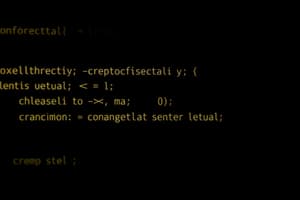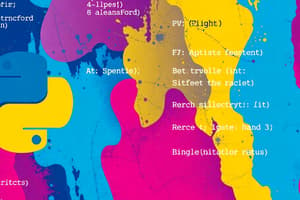Podcast
Questions and Answers
Which of the following statements about the scope of a variable is true?
Which of the following statements about the scope of a variable is true?
- A variable defined outside a function has local scope and is not accessible inside the function.
- A variable defined in a function has global scope.
- A variable defined in a function has local scope and is accessible outside the function.
- A variable defined outside a function has global scope and is accessible inside the function. (correct)
What is the purpose of the finally block in exception handling?
What is the purpose of the finally block in exception handling?
- To catch and handle exceptions
- To skip executing a block of code
- To execute code regardless of whether an exception is thrown or not (correct)
- To specify a default value for a variable
What happens when a function is called with a non-default parameter value?
What happens when a function is called with a non-default parameter value?
- The function is not executed
- The default value is used
- An error is raised
- The non-default value is used (correct)
What is the difference between a function's arguments and parameters?
What is the difference between a function's arguments and parameters?
What happens when a function encounters a return statement?
What happens when a function encounters a return statement?
What is the primary reason for using default parameters in a function?
What is the primary reason for using default parameters in a function?
Which of the following is a characteristic of a built-in function?
Which of the following is a characteristic of a built-in function?
What happens to the flow of execution when a function encounters an exception?
What happens to the flow of execution when a function encounters an exception?
What is the scope of a variable defined inside a function?
What is the scope of a variable defined inside a function?
What is the purpose of the try block in exception handling?
What is the purpose of the try block in exception handling?
Flashcards are hidden until you start studying
Study Notes
Functions
- There are three types of functions: built-in functions, functions defined in a module, and user-defined functions
- Built-in functions are pre-defined in Python and can be used directly
- Functions defined in a module are imported from external libraries
- User-defined functions are created by the programmer to perform specific tasks
- A user-defined function can be created using the
defkeyword - Functions can take arguments and parameters, which are values passed to the function when it is called
- Default parameters are assigned a value in the function definition, but can be overridden when the function is called
- Positional parameters are assigned a value based on their position in the function call
Function Execution and Scope
- The flow of execution is the order in which Python executes the code in a program
- When a function is called, the flow of execution jumps to the function and then returns to the point where the function was called
- Variables have scope, which determines where they can be accessed
- Global scope variables can be accessed from anywhere in the program
- Local scope variables are limited to the block of code where they are defined
Exception Handling
- Exception handling is a way to handle errors that occur during program execution
- The
tryblock contains the code that might raise an exception - The
exceptblock contains the code that handles the exception - The
finallyblock contains the code that is executed regardless of whether an exception was raised - Using
try-except-finallyblocks, programmers can anticipate and handle potential errors, making the program more robust and reliable
Functions
- There are three types of functions: built-in functions, functions defined in a module, and user-defined functions
- Built-in functions are pre-defined in Python and can be used directly
- Functions defined in a module are imported from external libraries
- User-defined functions are created by the programmer to perform specific tasks
- A user-defined function can be created using the
defkeyword - Functions can take arguments and parameters, which are values passed to the function when it is called
- Default parameters are assigned a value in the function definition, but can be overridden when the function is called
- Positional parameters are assigned a value based on their position in the function call
Function Execution and Scope
- The flow of execution is the order in which Python executes the code in a program
- When a function is called, the flow of execution jumps to the function and then returns to the point where the function was called
- Variables have scope, which determines where they can be accessed
- Global scope variables can be accessed from anywhere in the program
- Local scope variables are limited to the block of code where they are defined
Exception Handling
- Exception handling is a way to handle errors that occur during program execution
- The
tryblock contains the code that might raise an exception - The
exceptblock contains the code that handles the exception - The
finallyblock contains the code that is executed regardless of whether an exception was raised - Using
try-except-finallyblocks, programmers can anticipate and handle potential errors, making the program more robust and reliable
Studying That Suits You
Use AI to generate personalized quizzes and flashcards to suit your learning preferences.




